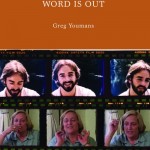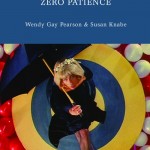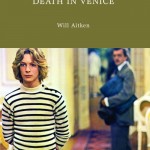The Queer Film Classics books series features three new books written for a generation that grew up in a world where it’s becoming more accepted to be queer. The books, at under 200 pages each and published by Arsenal Pulp Press, are about three films that helped to move the world into a more tolerant and understanding time.
 Greg Youman’s book Word Is Out is based on the classic documentary film of the same name. The documentary was a groundbreaking ode to a day in the life of a queer person at the tail end of the 1970s. While it was a big deal then, looked at today, most young people wouldn’t have a strong reaction to the film, based on the cultural shift in the last 30 years.
Greg Youman’s book Word Is Out is based on the classic documentary film of the same name. The documentary was a groundbreaking ode to a day in the life of a queer person at the tail end of the 1970s. While it was a big deal then, looked at today, most young people wouldn’t have a strong reaction to the film, based on the cultural shift in the last 30 years.
The book sets the pinnacle and mood by explaining why this film was so successful and all the historical events going on at the time, putting younger readers into the heart of the gay-rights movement that started over 30 years ago.
If Greg Youman’s Word Is Out is a book on the history of gay life in the ’70s, then Susan Knabe and Wendy Gay Pearson wrote the book for the ’80s and the war against HIV/AIDS in Zero Patience.
The book Zero Patience points out what the movie did, but in a blunt and loud way. It’s ridiculous to have such racism and hate towards people who are sick and dying. The conspiracy theory that HIV/AIDS was a gay disease brought to North America by a gay French-Canadian serial killer, who went out of his way to infect innocent victims, shows just what kind of paranoid world we were living in at that time.
 While the first two books focus on queer history, Will Aitken retells the history and origins of the original author of and the director behind Death in Venice. Both the author and director lived in the ’70s as closeted homosexual men and openly gay artists. Aidken helps to give reason behind the making of the queer (and arguably pedophilic) film about an older gentleman’s obsession with a boy of striking beauty.
While the first two books focus on queer history, Will Aitken retells the history and origins of the original author of and the director behind Death in Venice. Both the author and director lived in the ’70s as closeted homosexual men and openly gay artists. Aidken helps to give reason behind the making of the queer (and arguably pedophilic) film about an older gentleman’s obsession with a boy of striking beauty.
The Queer Film Classic books are rich with history, but they’re not traditional stories. They’re meant to help people born in a time of tolerance understand where that tolerance came from.

